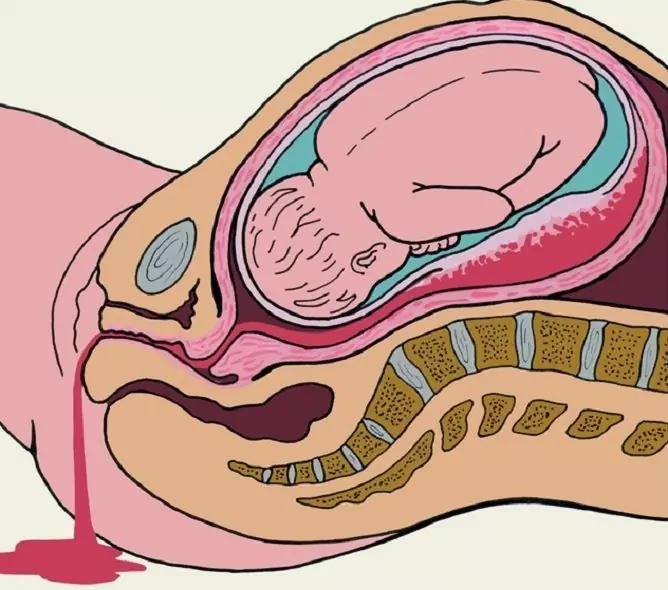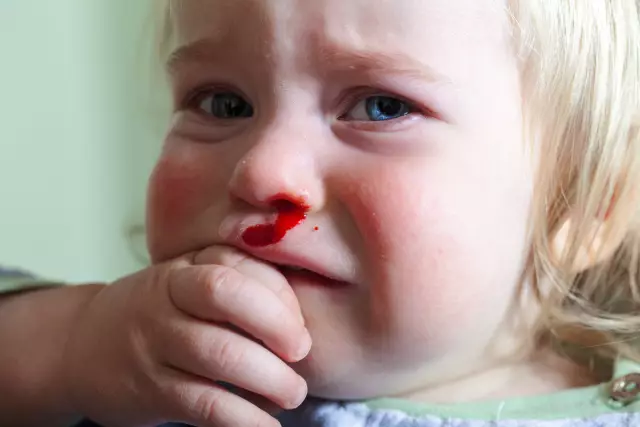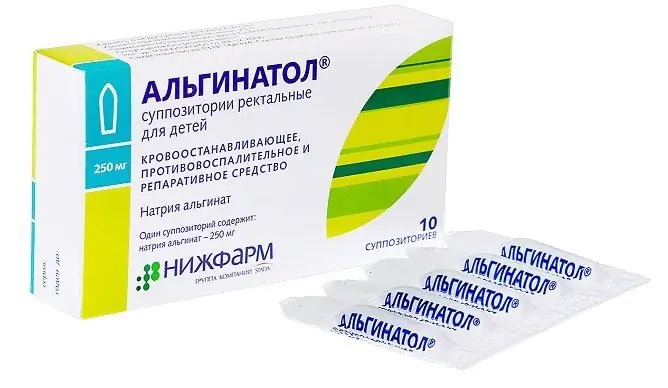- Author Rachel Wainwright wainwright@abchealthonline.com.
- Public 2023-12-15 07:39.
- Last modified 2025-11-02 20:14.
Gastric bleeding
The content of the article:
- Causes of gastric bleeding and risk factors
- Forms of gastric bleeding
- Symptoms of gastric bleeding
- Diagnostics
- Treating gastric bleeding
- Possible complications and consequences
- Forecast
- Prevention
Gastric bleeding is the outflow of blood from damaged vessels into the lumen of the stomach. This pathological condition occupies a leading position among all the reasons for emergency hospitalization in surgical hospitals.

Source: cardio-life.ru
More than a hundred pathologies are known that can lead to the development of gastric bleeding. The most common of these is gastric ulcer - bleeding occurs in about 20% of patients with a history of gastric ulcer in the absence of adequate treatment.
The stomach is a hollow muscular organ located between the esophagus and the duodenum. The function of the stomach is the accumulation of food mass, its mechanical and chemical processing, the absorption of certain substances, and further movement along the digestive tract. In addition, the stomach produces hormones and biologically active substances, performs protective and excretory functions. The volume of an empty stomach is approximately 0.5 liters, after eating the stomach can stretch to 1-4 liters. The size of the organ varies depending on the degree of its filling, as well as on the body type of the person. The wall of the stomach is formed by the serous, muscular, submucous and mucous membranes. The stomach consists of the entrance section, the fundus of the stomach, the body of the stomach, the pylorus. At the junction of the esophagus into the stomach is the venous plexus. In some pathological processes, the veins expand and are easily injured, which causes bleeding, sometimes quite significant.
Causes of gastric bleeding and risk factors
In addition to gastric ulcer, the main causes of gastric bleeding include non-ulcer lesions of the gastric mucosa, chronic renal failure, chronic stress, irrational intake of certain medications. More rare causative factors are: ischemia of the gastric mucosa against the background of cardiovascular pathology, malignant tumors, liver cirrhosis, tuberculosis and gastric syphilis, thermal and chemical burns of the gastric mucosa.

Source: econet.ru
Risk factors include:
- endocrine diseases;
- traumatic brain injury;
- shock conditions;
- sepsis;
- hemophilia;
- hypotension (especially a combination of low blood pressure and tachycardia);
- hernia of the esophageal opening of the diaphragm;
- polyps of the stomach, lipomas;
- atherosclerosis;
- general hypothermia;
- age over 60;
- deficiency of vitamins (especially vitamin K).
Forms of gastric bleeding
Gastric bleeding is classified into two main types:
- acute - develop quickly, the patient requires emergency medical care;
- chronic - develop more slowly, gradually lead to anemization of the patient.
In terms of severity, they are explicit and hidden.
According to the severity of blood loss, gastric bleeding can be:
- lungs (satisfactory condition, the patient is conscious);
- moderate (the patient is worried about dizziness);
- severe (the patient is severely inhibited, does not react to the environment).
Depending on the etiological factor, ulcerative and non-ulcerative gastric bleeding is isolated.

Source: gastrit-yazva.ru
Symptoms of gastric bleeding
The presence of certain signs of gastric bleeding depends on its duration and intensity.
If gastric bleeding occurs from small blood vessels of the stomach, and the volume of blood loss does not exceed 20% of the total volume of circulating blood, the patient's condition may remain satisfactory for a long period.
Non-intense short-term gastric bleeding can manifest itself as weakness, fatigue, decreased performance, dizziness when changing body position, flashing flies before the eyes, pallor of the skin, cold sticky sweat.
With the development of moderate gastric bleeding, blood accumulates in the stomach cavity, which partially enters the duodenum. Hemoglobin under the influence of gastric juice is converted into hematin. When a certain volume of blood accumulates in the patient, vomiting occurs with bloody contents, the color of which, due to the admixture of hematin, resembles coffee grounds.
With intense gastric bleeding, the stomach cavity fills with blood quickly, hemoglobin does not have time to oxidize, and a large amount of unchanged scarlet blood is present in the vomit. Blood that enters the duodenum and passes through the digestive tract stains the stool black. Patients have a decrease in blood pressure, dry mucous membranes, tinnitus, frequent weak pulse, lethargy. With profuse blood loss - impaired consciousness (including coma), hemorrhagic shock, impaired renal function. With profuse bleeding and / or untimely seeking medical care, there is a high risk of death.
Against the background of sepsis and / or shock, patients may experience stressful stomach ulcers, in the pathogenesis of which the main role belongs to ischemia of the mucous membrane, disruption of the mucous barrier of the stomach and increased secretion of hydrochloric acid. Massive bleeding is observed in 4-15% of patients with stress gastric ulcers.
Diagnostics
Diagnosis of gastric bleeding is based on data obtained during the collection of complaints, anamnesis, physical examination, instrumental and laboratory studies.
If gastric bleeding is suspected, a general blood test is prescribed (a decrease in the number of erythrocytes and platelets, a decrease in hemoglobin level is determined), a fecal occult blood test, a coagulological blood test, the nature of vomit is studied.

Source: gastroprocto.ru
During fibrogastroduodenoscopy, the mucous membranes of the esophagus, stomach and duodenum are examined, this allows you to detect the source of bleeding. If it is impossible to conduct it, to determine the etiological factor, an X-ray examination of the stomach with contrast can be performed.
If a vascular pathology is suspected, angiography is indicated. To confirm the diagnosis, a radioisotope scan may be needed (if it is impossible to detect the bleeding site by other methods), as well as magnetic resonance imaging and ultrasound of the abdominal organs.
Treating gastric bleeding
Treatment of light and moderate gastric bleeding, in which there is no significant deterioration in the patient's condition, is carried out on an outpatient basis or in the gastroenterology department. Patients are shown strict bed rest, an ice pack is placed on the epigastric region. To stop bleeding, hemostatic drugs are prescribed. For this purpose, adrenaline and norepinephrine are injected into the stomach through a probe. For minor bleeding, apply medical glue to the affected area. To cleanse the intestines from bloody masses, cleansing enemas are shown. Iron supplements are prescribed to correct post-hemorrhagic anemia.
In case of profuse gastric bleeding, hospitalization in the intensive care unit is mandatory. With pronounced signs of blood loss, the patient is transported on a stretcher with the head end lowered. The volume of circulating blood is restored by colloidal, crystalloid solutions, blood preparations, which are administered intravenously. After relative stabilization of the patient's condition, an emergency stop of gastric bleeding is carried out by clipping, ligating the affected vessels or stitching bleeding gastric ulcers by means of gastroduodenoscopy.
Surgical intervention is indicated in cases when it is not possible to stop the bleeding with the help of other methods, with severe gastric bleeding, accompanied by a significant decrease in blood pressure, repeated bleeding, and the development of complications.
According to the indications, the following methods of surgical treatment of gastric bleeding are used:
- suturing the affected area;
- removal of part of the stomach;
- plastic of the place of transition of the stomach into the duodenum;
- intervention on the vagus nerve.
The operation can be performed by open or laparoscopic (preferably) access.
The terms of rehabilitation after surgical treatment of gastric bleeding vary depending on the method of surgery. The stitches are usually removed on the 8th day after the operation, the patient is discharged from the hospital on about the 14th day. In the rehabilitation period, the patient is shown a gentle diet, physiotherapy exercises. Large physical activity is contraindicated during the next month.
Possible complications and consequences
Gastric bleeding can be complicated by hemorrhagic shock, post-hemorrhagic anemia. In elderly patients, even with surgical treatment of gastric bleeding, there is a high risk of recurrence.
Forecast
The prognosis depends on the timeliness of diagnosis and treatment. In the case of minor gastric bleeding with timely provision of medical care to the patient, the prognosis is usually favorable. With the development of profuse bleeding, the prognosis worsens. Mortality in gastric bleeding is 4-25%.
Prevention
In order to prevent the development of gastric bleeding, it is recommended:
- timely and adequate treatment of diseases that can lead to gastric bleeding;
- refusal of self-medication, uncontrolled use of medicines;
- balanced diet;
- rejection of bad habits;
- avoiding hypothermia;
- strengthening immunity.
YouTube video related to the article:

Anna Aksenova Medical journalist About the author
Education: 2004-2007 "First Kiev Medical College" specialty "Laboratory Diagnostics".
The information is generalized and provided for informational purposes only. At the first sign of illness, see your doctor. Self-medication is hazardous to health!






